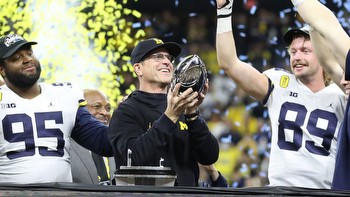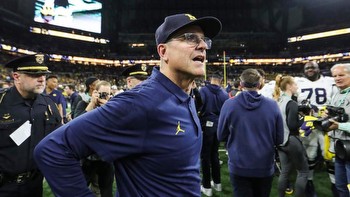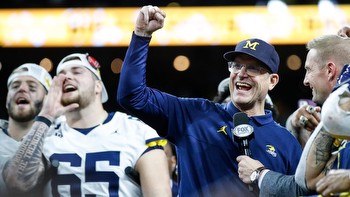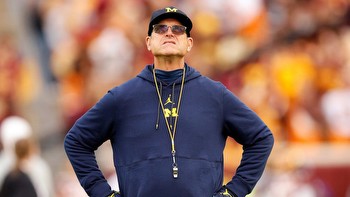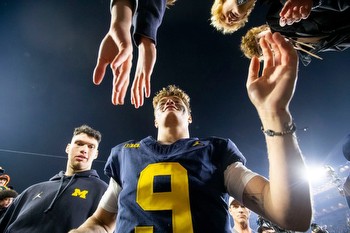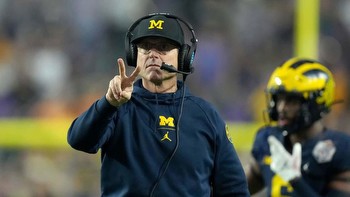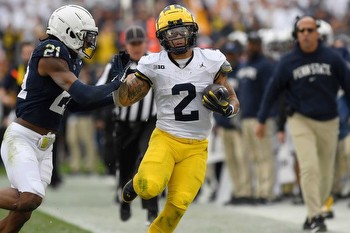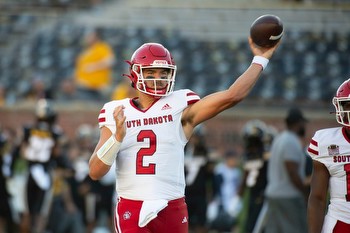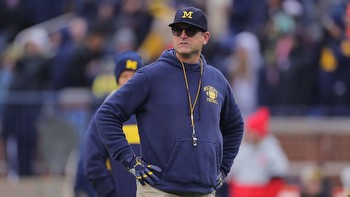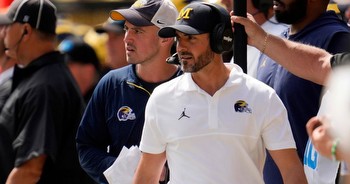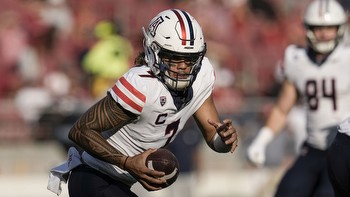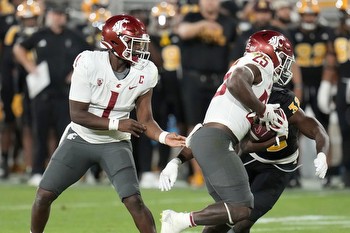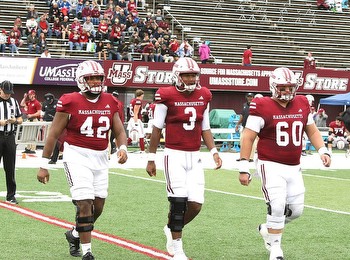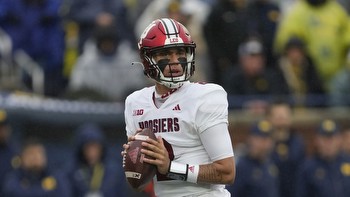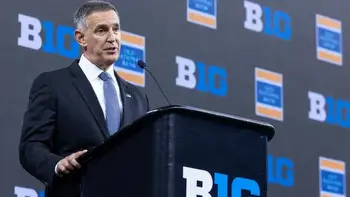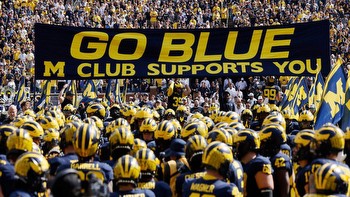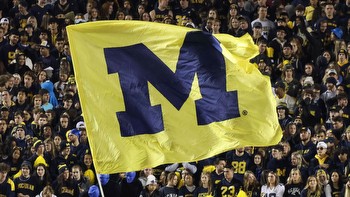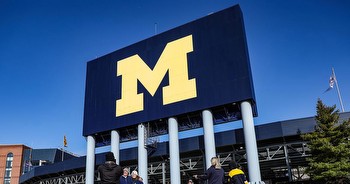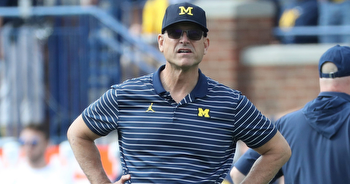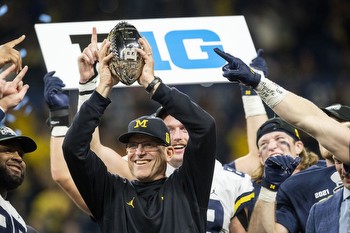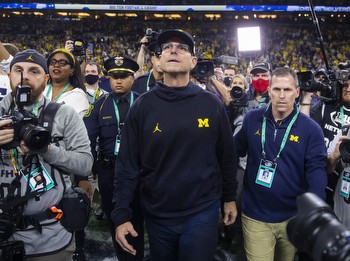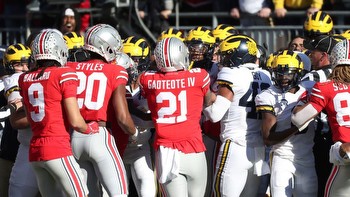Mandel: If Michigan is found guilty, should it be penalized before selection of College Football Playoff?
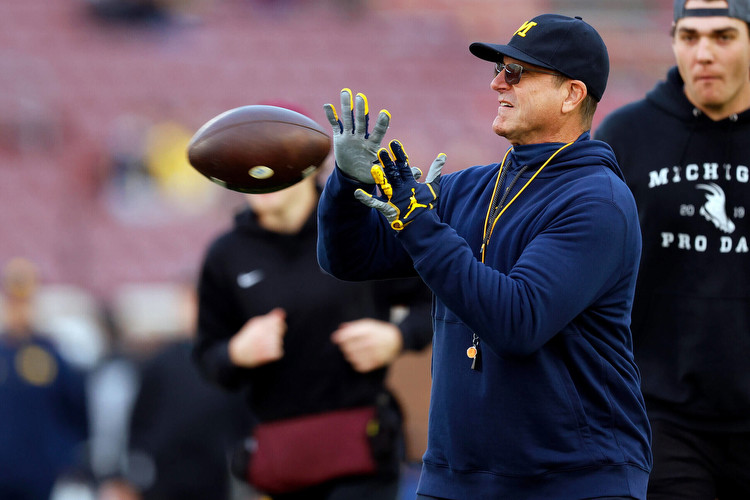
The Michigan Wolverines have outscored their first seven opponents 276-47. They’ve been so impressive that six of the eight writers (this one included) who participated in The Athletic’s midseason predictions picked the Wolverines to win the 2023 national championship.
But there’s been a significant development since we turned in those predictions. The NCAA is investigating second-ranked Michigan for alleged cheating — this season.
We’re not talking about the typical NCAA case of a booster giving a player money six years ago for which the school is only now receiving a postseason ban. Or an assistant got caught paying for kids’ unofficial visits and now the program is going to be docked scholarships next year. Stuff that maybe, possibly would have one day led to a team gaining an edge by having a slightly better roster than its opponent.
This is something that more directly and immediately affects the outcome of games, with an investigation surrounding a team building a clear case for the College Football Playoff. We’re talking more in the range of “counting cards in blackjack” or “golfer subtly kicks ball out of brush while no one’s looking.”
As The Athleticreported Thursday, Michigan is under investigation by the NCAA; a source briefed on the investigation says the school is accused of using “a vast network” to steal opposing teams’ signs. Stealing signs on its own is not illegal, but the NCAA is allegedly investigating whether Michigan violated NCAA Bylaw 11.6.1, which prohibits in-person scouting of opponents. On Friday, Michigan announced it had suspended staff member Connor Stalions, whom ESPN first identified as a central figure in the NCAA’s investigation.
GO DEEPER
Michigan investigation: Explaining CFB's sign-stealing rules, what's next for Harbaugh
So here’s the question: If before the heart of bowl season Michigan is found guilty of breaking that NCAA rule, should it be penalized before the selection of the College Football Playoff field? While plenty of teams across various sports have had championships vacated retroactively, this is a rare situation in which alleged violations with immediate competitive implications have come to light before the semifinals are set.
The NCAA’s typically laborious infractions process perhaps makes that timeline unfeasible. But what about the Big Ten, which has an obligation to protect the integrity of its contests? The conference has in the past punished coaches and players who violated policies surrounding sportsmanship, often within days of an incident. Michigan State cornerback Khary Crump is serving an eight-game suspension the conference imposed following last year’s tunnel brawl at Michigan.
If the league has evidence of Michigan cheating, should it ban the Wolverines from the conference championship game?
And absent that, what about the College Football Playoff selection committee? The protocol it follows gives its members latitude to “consider other relevant factors” that affect the outcome of games, most commonly injuries to key players. If Michigan is found guilty of breaking rules, is that enough to dock the Wolverines in their rankings?
“The committee will consider anything that happens in a game,” CFP executive director Bill Hancock told The Athletic.
These are all questions that will become increasingly relevant if Michigan keeps winning and appears more and more likely to compete for a conference championship and the national championship. And there’s no recent template for the powers that be to follow.
Many of you reading this will invariably roll your eyes and say Michigan would have beaten East Carolina, UNLV, Bowling Green, Rutgers, Nebraska, Minnesota and Indiana with or without illegally obtained info. That’s probably true. But there are players on the other side out there trying to win under the assumption that they are competing on an even field.
Many of you reading this will invariably roll your eyes and say, hey, sign stealing is common. Almost everyone does it. That’s definitely true. The Athletic’s Bruce Feldman wrote a story about sign stealing in 2018 full of anecdotes of college and NFL teams that did it — including an anonymous first-person account from an admitted sign stealer.
GO DEEPER
The game within a game: Secrets of a college football signal stealer
But all of those stories involved someone who was either really good at picking up signals off game film or really good at deciphering signs once the game started. The parties involved chalked it up as part of the game.
“If you sneak in and go to somebody’s practice, it’s unethical,” a longtime defensive coordinator told Feldman. “If somebody steals my signals, that’s on me. It’s up to you to keep things changed up.”
But the NCAA’s Michigan investigation involves allegations of a higher level of brazenness. The rule against in-person scouting is well known. Which means the people in charge of protecting the integrity of competitions may have some urgent decisions to make.
The standard route here would be to wait for the NCAA investigation to play out, which could take weeks, months or years. Perhaps Michigan gets fined at its conclusion. Perhaps coach Jim Harbaugh gets suspended again. Perhaps Stalions is fired. The world moves on.
And that would all be harmless … if Michigan was 7-5. But Michigan is 7-0 with the second-best odds to hoist the national championship trophy in January — a championship that may carry a permanent asterisk if it’s found Michigan spent half its championship season playing with an unfair competitive advantage.
If the evidence is credible, you would think that the Big Ten, the NCAA and the CFP would want to ensure its participants and their fans that they won’t tolerate any manipulation of their contests.

